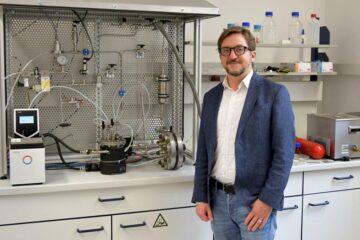Single or Entangled Photon Source

</a><strong>Background</strong><br>
For high security quantum cryptography electrically triggered single or entan-gled photon sources are needed. In addition the mass market requires effi-cient, electrically driven, high-speed devices. Common growth and pro-cessing techniques are used to fabricate single photon sources which either generate polarization entangled photon pairs or polarization controlled single photons. This offers the opportunity for quantum cryptography with single photons or entangled photon pairs.</p> <p><!–break–></p> <p class=“MsoNormal“ style=“margin-bottom: 0.0001pt;“><strong>Technology</strong><br> We offer a method for producing a single or entangled photon source, which can be carried out in a simple and reproducible manner. This novel method enables the production of a compact single photon source which can emit defined linearly polarized single photons, transposed photon pairs or cas-cades of correlated photons. The fine structure splitting of the exciton energy level of a quantum dot (QD) is dependent on material strains. It is the invention to selectively establish the degree of strain within the quantum dots and within the surrounding material structure by the choice of the QD size.<br> <br> <strong>Benefits</strong><br> <ul> <li>Choice of electrically triggered entangled or single photon source</li> <li>Thermo-electrical cooling</li> <li>Mass production possible</li> </ul><br> <strong>IP Rights</strong><br> German Patent DE 102005057800 B4<br> European/ US/ Japanese Patent Application<strong><br> <br> Patent Owner</strong><br> Technische Universität Berlin, Germany</p>
Weitere Informationen: PDF
ipal GmbH
Tel.: +49 (0)30/2125-4820
Ansprechpartner
Dr. Dirk Dantz
Media Contact
Alle Nachrichten aus der Kategorie: Technologieangebote
Neueste Beiträge

Ideen für die Zukunft
TU Berlin präsentiert sich vom 22. bis 26. April 2024 mit neun Projekten auf der Hannover Messe 2024. Die HANNOVER MESSE gilt als die Weltleitmesse der Industrie. Ihr diesjähriger Schwerpunkt…

Peptide auf interstellarem Eis
Dass einfache Peptide auf kosmischen Staubkörnern entstehen können, wurde vom Forschungsteam um Dr. Serge Krasnokutski vom Astrophysikalischen Labor des Max-Planck-Instituts für Astronomie an der Universität Jena bereits gezeigt. Bisher ging…

Wasserstoff-Produktion in der heimischen Garage
Forschungsteam der Frankfurt UAS entwickelt Prototyp für Privathaushalte: Förderzusage vom Land Hessen für 2. Projektphase. Wasserstoff als Energieträger der Zukunft ist nicht frei verfügbar, sondern muss aufwendig hergestellt werden. Das…

















